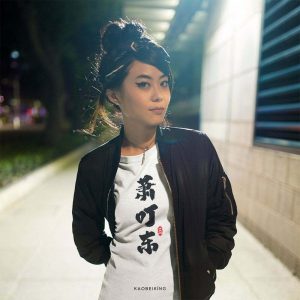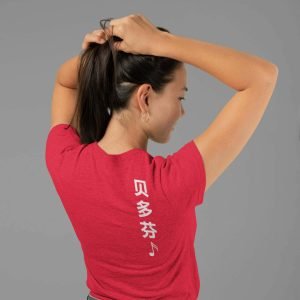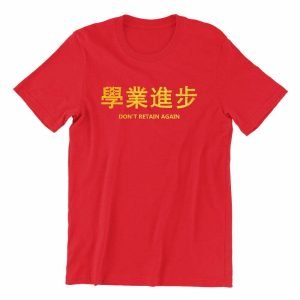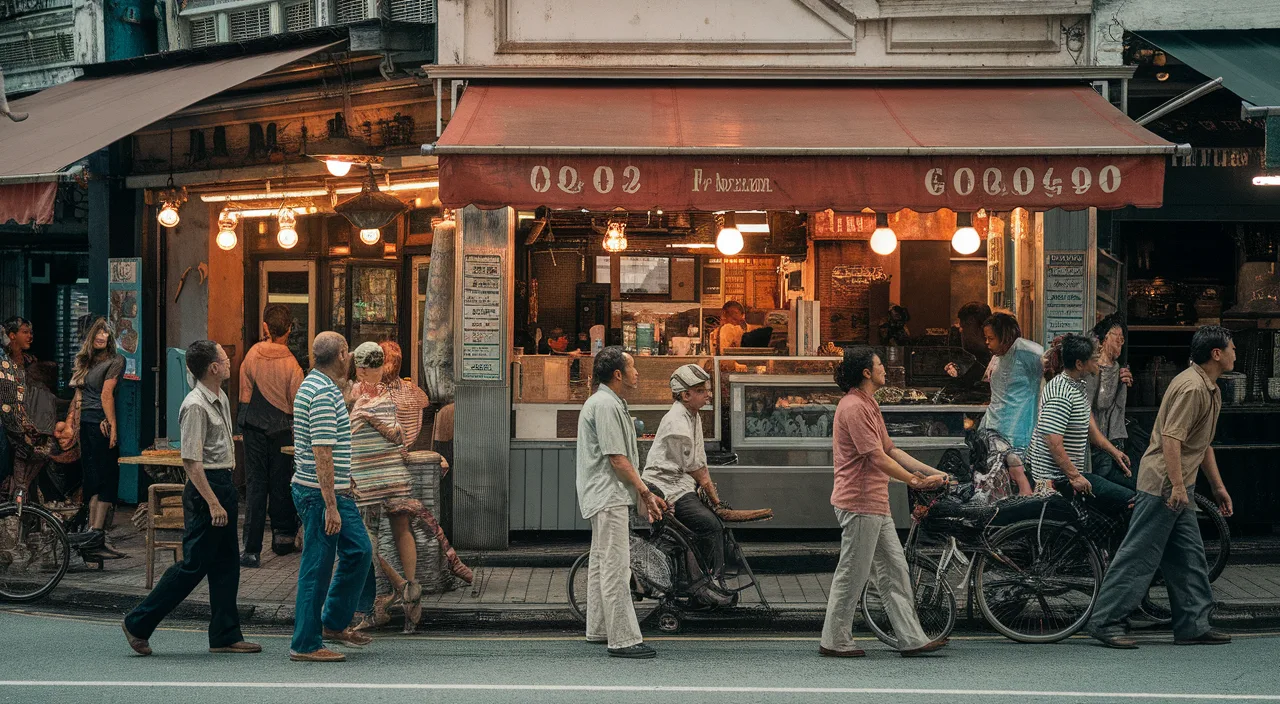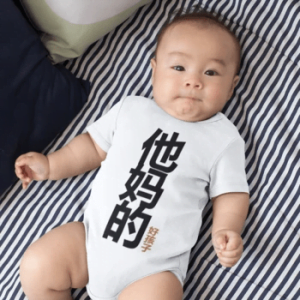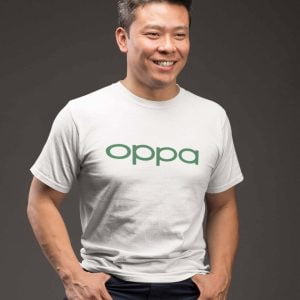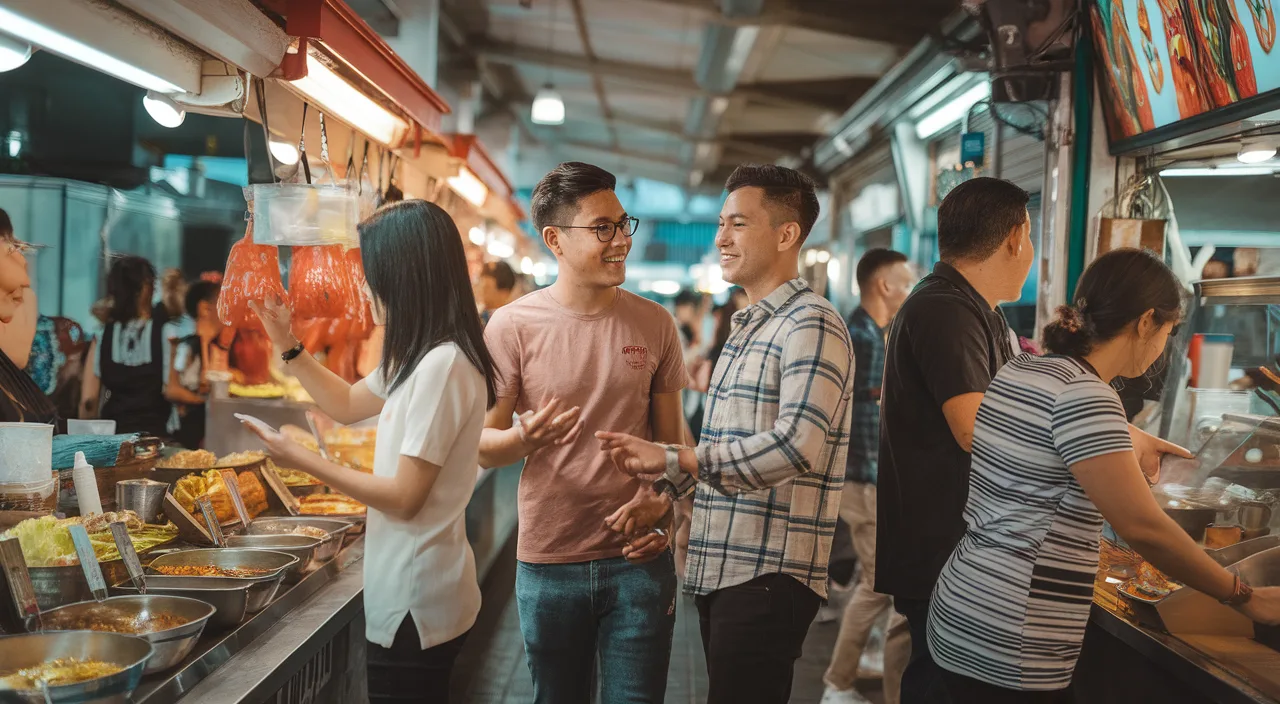What does ‘Pang gang’ mean in Singlish?
Short answer? Pang gang in Singlish means “finish work” or “knock off”. It’s what you say when you’re done punching keys on your laptop or sweating through a shift, and you’re ready to zhao (escape) from work and head to makan or chill.
-
Chinese, KaoBeiKing, Quote, T-shirts, Typography
Price range: $30.00 through $38.00 Select options This product has multiple variants. The options may be chosen on the product page
- Phrase Type: Local slang (noun/verb, depending on use)
- Used by: Pretty much everyone from office workers to hawker uncles
- Emotional tone: Relief, excitement, a bit of drama
- Common usage: “Eh, what time you pang gang today?” / “I pang gang at six can go eat liao.”
Yup, it’s casual, versatile, and ultra-relatable. But oh — there’s more to this essential Singlish phrase than just clocking out. Ready to pang gang from the basics and dive deeper? Shiok one.
TL;DR: The Power of ‘Pang gang’ in a Nutshell
- Pang gang is Singlish for “knock off work” or finish one’s job for the day.
- It has strong roots in colloquial street talk and Hokkien/Malay influences.
- The phrase isn’t just functional — it carries emotional weight and cultural pride.
- Often heard in everyday workplaces, pasar malam stalls, and taxi backseats.
- Using pang gang right can show cultural awareness (and deliver major hometown points).
- It’s a linguistic timestamp — revealing how Singaporean language evolves through work, hustle, and real-life vibes.
- This article explores origins, usage, cultural depth, and pro-tips to use pang gang like a true local.
The Origin Story of ‘Pang Gang’
Let’s go back in time. Not quite kampung days but somewhere between wet markets and early MRT lines.
The term pang gang likely stems from Hokkien and/or Malay influence. In Hokkien, “pang” (放) means to release or put down, while “gang” is believed to be a local pronunciation of “kerja” (Malay for ‘work’).
Put that together — and voila — you get “放(工)” in Chinese or “release work”. Basically: Put down your tools and go home lah.
-
Chinese, KaoBeiKing, Singlish/Hokkien, T-shirts, Typography, Women
Price range: $30.00 through $38.00 Select options This product has multiple variants. The options may be chosen on the product page -
Chinese, Chinese New Year, Ladies, Mens, T-shirts
Price range: $35.00 through $43.00 Select options This product has multiple variants. The options may be chosen on the product page
Back in the 70s and 80s, factory workers, delivery men, and kopitiam staff would holler this to signal end-of-day. It caught on quickly — maybe because nothing feels better than throwing off your apron and yelling “I pang gang already!” before heading next door for a Tiger Beer.
That’s when pang gang became etched in our collective lexicon — a ritual of release and relief that perfectly captures Singapore slang at its finest.
Evolution of ‘Pang Gang’ in Singaporean Culture
Fast forward to today, and pang gang has upgraded from oily mechanic overalls to startup Slack messages.
Don’t be surprised if a young tech exec types “ok I pang gang liao, ttyl” into the company group chat. It fits anywhere — in person, on IG captions (“Finally pang gang from this 10-day project #teamnosleep”), and even in parody songs about office life (you know who you are).
Despite shifts in context, the spirit remains unchanged: Pang gang is pure Singaporean DNA — resilient, relatable, and rhythmic like roti prata flipping on a Sunday morning.
There’s something comforting about saying you “pang gang” instead of “I finished work”. The former feels legit; the latter sounds like you’re working in London.
In our increasingly hybrid world and post-pandemic chaos, this Singlish phrase continues to serve not only as a signal of exiting the grind, but also a shared emotion — exhaustion laced with satisfaction. Language evolution at its most authentic.
-
Chinese, KaoBeiKing, Quote, Romper, Typography
$25.00 Select options This product has multiple variants. The options may be chosen on the product page -
KaoBeiKing, Men, Parody, T-shirts, Typography
Price range: $30.00 through $38.00 Select options This product has multiple variants. The options may be chosen on the product page
Unpacking the Meaning: How ‘Pang Gang’ is Used
You can use it as a question:
- “You pang gang what time?”
- “Eh boss nvr let me pang gang early sia.”
Or a declaration:
- “Ok ah, I pang gang liao! Byeee!”
- “Today sure no pang gang before 11pm one.”
Sometimes it’s used ironically — like when you’re stuck at work but your soul already pang gang halfway.
Other permutations you’ll hear in local expressions:
- “Late pang gang” – Overtime vibes
- “Fake pang gang” – Say finish but still hanging around
- “Pang gang straight go makan” – The reward we deserve
It’s ultra-flexible, and more expressive than its English equivalents. Saying, “I just knocked off” versus “I pang gang liao” – guess which one makes your colleague nod with sympathy?
Historical Context: From Street Talk to Mainstream Slang
Back in the old days, certain words were deemed too “lah” to be “proper.” But look at Singlish now — a badge of identity and cultural pride.
Pang gang followed that arc too. Once considered street talk overheard in pasar or tekan army days, it’s now proudly embedded even in high-level chats. It popped up in National Day Rally soundbites, local TV dramas (looking at you, Channel 8), and millennial tote bags.
Why? Because Singlish has evolved from ‘broken English’ to a smart, layered dialect — a living hybrid reflecting Singapore’s blended roots.
Pang gang is not just a phrase. It’s a timestamp:
- Of sweat wiped away after a hard day’s labour
- Of drink stalls closing shutters and aunties heading home
- Of students completing last-minute projects before crashing
It’s a cultural expression that unites blue-collar workers and CBD hustlers alike, showcasing how language evolution shapes our identity.
Mastering the Art of ‘Pang Gang’ in Conversations
Wanna blend in with the locals or maybe impress your Singaporean date? Say pang gang right and congrats — you’ve unlocked Level 1 in Advanced Singlish.
Here’s how to level up with this essential Singapore slang:
1. Timing is Everything
Don’t say pang gang too early unless you wanna kena judged. Before 5:30pm ah – better say “break” or “chill”.
2. Pair it with Other Local Expressions
Example:
- “Weather so hot today, faster pang gang go makan lah.”
- “Boss drag meeting until pengsan, still cannot pang gang.”
3. Use It Like a Pro
When your friend says “eh you pang gang liao?”, don’t just go “yeah.”
Say: “Ya lah, brain off already. Time to relax, zhor lor!”
Instant XP boost.
4. Don’t Force It
If you’re new to this — no need to drop pang gang after every sentence. It’s an organic vibe, not a word-of-the-day calendar.
5. Situational Mastery
From office bounce-outs to NS training field exits, know when and where to use pang gang without sounding weird. Match tone. Observe locals using this Singlish phrase naturally.
Final Thought: Why ‘Pang Gang’ Matters More Than You Think
In our hyper-productive, ever-on culture, there’s something powerfully human about declaring, “I pang gang liao.”
It’s you taking back your time. Your rest. Your right to chill. Whether you’re peeling kopi eggs during a uni assignment or clocking shifts during hungry ghost month, pang gang marks the sacred pause that every Singaporean craves.
And that, dear reader, is why pang gang isn’t just Singapore slang. It’s a whole entire vibe that captures the essence of our local culture.
Frequently Asked Questions about ‘Pang Gang’
1. Can I use “pang gang” in formal settings?
Unless your boss also eats cai fan and speaks Singlish — better not in formal reports. But saying it casually in team chat? Can, lah.
2. Is “pang gang” only used in Singapore?
Yes, it’s a uniquely Singaporean expression. You won’t hear it in KL or JB, even though they also mix Malay and Chinese terms.
3. How do I pronounce “pang gang” correctly?
It rhymes like “bunk-bunk” but with soft “pang” (like ‘pung’) and ‘gang’ (like ‘gung’). Think: pahng-gahng.
4. Is it okay for expats to use “pang gang”?
Yes! Locals appreciate effort. Just use it naturally and maybe avoid exaggerating the Singlish accent if you’re still learning.
5. What’s the English equivalent of ‘pang gang’?
“Knock off work” or “logging out for the day” are closest — but honestly, they don’t carry the same oomph.
6. Is there a past tense version of ‘pang gang’?
Not exactly. Just say: “I pang gang liao.” That covers it — past tense vibe settled.
7. Does “pang gang” mean quitting your job?
Nope. It means ending work for the day — not resigning. Don’t sabo yourself hor!


